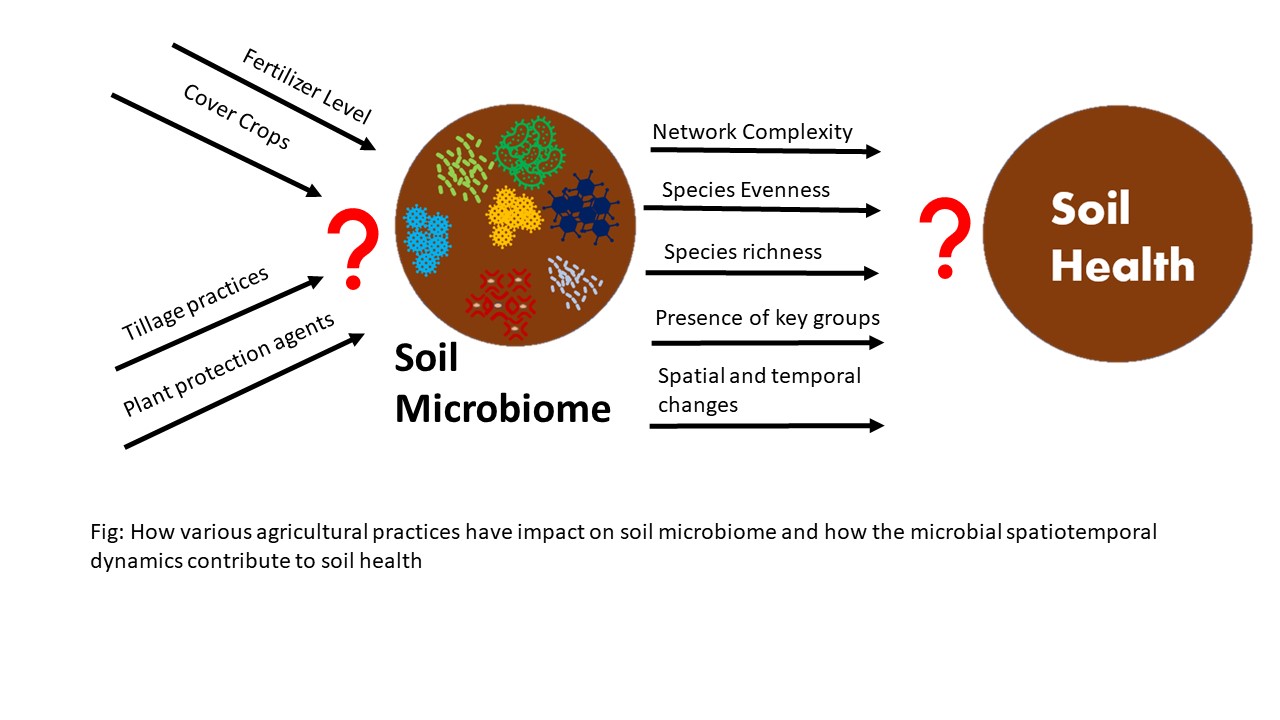Project Overview
Commodities
- Agronomic: corn, soybeans, sunflower, wheat
Practices
- Animal Production: manure management, parasite control
- Crop Production: application rate management, biological inoculants, conservation tillage, cropping systems, crop rotation, fertilizers, nutrient cycling, nutrient management, organic fertilizers
- Education and Training: farmer to farmer, mentoring
- Farm Business Management: feasibility study
- Natural Resources/Environment: biodiversity, indicators, soil stabilization
- Pest Management: biological control
- Production Systems: organic agriculture
- Soil Management: nutrient mineralization, organic matter, soil analysis, soil chemistry, soil microbiology, soil quality/health
- Sustainable Communities: community development, sustainability measures
Abstract:
Growing global population demands for the increment on the food production on the same rate the population is increasing. Various agricultural production practices these days to attain these demands are threat for the food security of the future generation and for the balance of agroecosystems. The physical, chemical, and biological wellness of soil is important for the ecosystem balance and food production. Soil microbes play a pivotal role on the agroecosystem by facilitating number of processes incurring. Despite this, the role of microbial communities on the improvement of soil health has not been studied to optimize these benefits for the food production. This gap exists because of the inadequate understanding about the microbial communities and how they can be manipulated for sustainable agricultural practices that the future is seeking for. The clear definition and understanding of soil health and the role of soil microbiome on maintaining better soil health is still not vivid among the producers. The proposed research aims to investigate how microbial communities contribute to soil health and how agricultural practices have an impact on microbial spatiotemporal dynamics. In this project, I will use the North Dakota Agriculture Microbiome project as the baseline and extend it to conduct field surveys and manipulative experiments to understand the contribution of microbiomes to soil health and agricultural practices affect that contribution. I will perform the latest molecular sequencing approaches to analyze the assembly, recruitment and functioning of microbial communities under various agricultural practices. I will also test findings in a long-term field trial to further assess the consistency of field data. By combining the crop yield and management information from farmlands and the long-term field trial, I will create statistical models illustrating the contribution of microbial parameters to soil health under different scenarios. The knowledge on the importance of soil microbes and soil health improvement is growing among the producers of North Dakota. I will facilitate the deepening of this understanding by reaching the producers through existing extension activities. I will prepare the extension materials focusing the impact of the intensive agricultural practices have on the microbial communities and sustainable practices that can be adapted to promote these communities. The project aims to disseminate information about the microbial communities, their impact on plant and soil health, and the effects that agricultural practices have on these communities.
Project objectives:
The project aims at exploring the impact various agricultural practices have on the spatiotemporal dynamics of microbes which includes their functioning, assembly, recruitment, and relationship within the microbiome. As an outcome, the project aims at an increased understanding of the producers of North Dakota about the soil health and roles of microbial communities in soil health. Further, the project aims to engage the producers in surveys so that they can learn how different agricultural practices shape microbiomes with subsequent impact on soil health. In addition, the project aims at preparing and publishing various extension materials which would help the producers gather knowledge on microbial communities at their agricultural lands. With this knowledge the project intends to help farmers adapt farming practices which would promote the soil health and adapt the sustainable approaches of farming as per the recommendations made. The project aims to increase awareness among the producers about the sustainable farming approaches that harness the soil microbes and improve overall physical, chemical, and biological qualities of soil. The project also aims to publish the scientific publications and impart them to the extension specialists of North Dakota, who acknowledge the producers about the production sustainability and soil wellness. Thus, the project aims to promote sustainable farming and climate-resilient agroecosystems in North Dakota.
